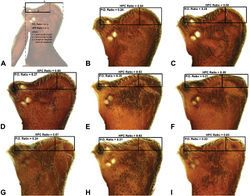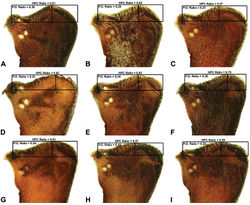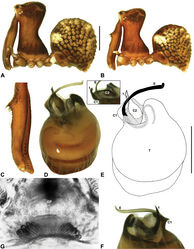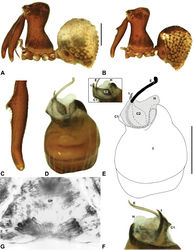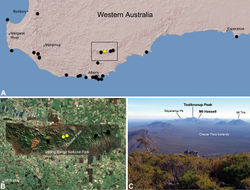Zephyrarchaea melindae
| Notice: | This page is derived from the original publication listed below, whose author(s) should always be credited. Further contributors may edit and improve the content of this page and, consequently, need to be credited as well (see page history). Any assessment of factual correctness requires a careful review of the original article as well as of subsequent contributions.
If you are uncertain whether your planned contribution is correct or not, we suggest that you use the associated discussion page instead of editing the page directly. This page should be cited as follows (rationale):
Citation formats to copy and paste
BibTeX: @article{Rix2012ZooKeys191, RIS/ Endnote: TY - JOUR Wikipedia/ Citizendium: <ref name="Rix2012ZooKeys191">{{Citation See also the citation download page at the journal. |
Ordo: Araneae
Familia: Archaeidae
Genus: Zephyrarchaea
Name
Zephyrarchaea melindae Rix & Harvey sp. n. – Wikispecies link – ZooBank link – Pensoft Profile
==
Toolbrunup Assassin Spider
Type material
Holotype male: Stirling Range National Park, Mount Hassell, Western Australia, Australia, 34°22'41"S, 118°04'15"E, sifting elevated leaf litter under Lepidosperma sedges near summit, 726 m, 22.IV.2009, M. Rix (WAM T118986).
Paratypes: Allotype female and 1 juvenile, Toolbrunup Peak, 34°23'02"S, 118°02'55"E, sifting elevated leaf litter under low herbaceous shrubs near summit, 964 m, 10.IV.2009, M. Rix, H. Wood (WAM T97468DNA: TP-152-F/TP-153-J).
Other material examined
AUSTRALIA: Western Australia: Stirling Range National Park: same data as holotype, 2 juveniles (WAM T97467DNA: HA-150-J/HA-151-J).
Etymology
The specific epithet is a patronym in honour of Dr Melinda Moir, in recognition of her contributions to biodiversity research, especially in the Stirling Range National Park of southern Western Australia.
Diagnosis
Zephyrarchaea melindae can be distinguished from Zephyrarchaea janineae and Zephyrarchaea mainae by the absence of dorsal hump-like tubercles on the abdomen (Figs 14A–B); from Zephyrarchaea marae sp. n., Zephyrarchaea marki, Zephyrarchaea porchi sp. n. and Zephyrarchaea vichickmani sp. n. by the shape of tegular sclerites 2–3, which do not project beyond the retro-distal rim of the tegulum (Figs 14D–E); and from Zephyrarchaea barrettae sp. n. by the shape of the anterior margin of the diastema adjacent to the ‘neck’, which is straight (in females) or only slightly concave in lateral view (in males) (Figs 14A–B cf. Figs 15A–B). Females further distinguished from other known congeners by the combination of a spherical abdomen (Fig. 14A), shallow post-ocular depression in lateral view (Fig. 9H), taller carapace (CH/CL ratio > 1.70) (Figs 7, 14A) and straight, almost vertical anterior margin of the diastema adjacent to the ‘neck’ (Fig. 14A).
This species can also be distinguished from other genotyped taxa (see Fig. 3) by the following three unique nucleotide substitutions for COI and COII (n = 4): G(165), G(924), T(1533).
Description
Holotype male: Total length 3.15; leg I femur 2.37; F1/CL ratio 2.01. Cephalothorax dark reddish-brown; legs tan brown with darker annulations; abdomen mottled grey-brown and beige, with reddish-brown dorsal scute and sclerites (Fig. 14B). Carapace relatively short (CH/CL ratio 1.77); 1.18 long, 2.09 high, 1.18 wide; ‘neck’ 0.68 wide; highest point of pars cephalica (HPC) approaching posterior third of ‘head’ (ratio of HPC to post-ocular length 0.62), carapace with shallow concave depression anterior to HPC; ‘head’ not strongly elevated dorsally (post-ocular ratio 0.20) (Fig. 8E). Chelicerae with proximal brush and additional comb of accessory setae on anterior face of paturon (Fig. 14C). Abdomen 1.64 long, 1.23 wide; almost spherical in lateral profile, without dorsal hump-like tubercles; dorsal scute fused anteriorly to epigastric sclerites, extending posteriorly to cover anterior two-thirds of dorsal abdomen. Unexpanded pedipalp (Figs 14D–F) pyriform, with broad, distally curved embolus supported by conductor sclerites 1–2; tegular sclerite 1 (TS 1) strongly curved, claw-like in prolateral view, with twisted, flattened and broadly rounded apex; TS 2–3 not projecting beyond retro-distal rim of tegulum.
Allotype female: Total length 3.54; leg I femur 2.50; F1/CL ratio 1.93. Cephalothorax dark reddish-brown; legs tan brown with darker annulations; abdomen mottled grey-brown and beige (Fig. 14A). Carapace relatively short (CH/CL ratio 1.86); 1.29 long, 2.41 high, 1.28 wide; ‘neck’ 0.78 wide; highest point of pars cephalica (HPC) approaching middle of ‘head’ (ratio of HPC to post-ocular length 0.57), carapace with shallow concave depression anterior to HPC; ‘head’ not strongly elevated dorsally (post-ocular ratio 0.19) (Fig. 9H). Chelicerae without accessory setae on anterior face of paturon. Abdomen 1.95 long, 1.51 wide; spherical in lateral profile, without dorsal hump-like tubercles. Internal genitalia (Fig. 14G) with cluster of ≤ 15 sausage-shaped spermathecae either side of gonopore, clusters widely separated along midline of genital plate.
Distribution and habitat
Zephyrarchaea melindae is known only from the summits of Toolbrunup Peak and nearby Mount Hassell, in the western Stirling Range National Park of southern Western Australia (west of Chester Pass) (Fig. 24). Specimens have been collected by beating and sifting sedges (Lepidosperma sp.) and low shrubs in montane heathland habitats.
Conservation status
This species is a short-range endemic taxon (Harvey 2002b[1]), with a maximum total range of less than 10 km2, and all known populations in the western Stirling Range National Park potentially threatened by fire, dieback disease (affecting montane vegetation) and climate change.
Original Description
- Rix, M; Harvey, M; 2012: Australian Assassins, Part II: A review of the new assassin spider genus Zephyrarchaea (Araneae, Archaeidae) from southern Australia ZooKeys, 191: 1-62. doi
Other References
- ↑ Harvey M (2002b) Short-range endemism among the Australian fauna: some examples from non-marine environments. Invertebrate Systematics 16: 555-570. doi: 10.1071/IS02009
Images
|
- ↑ 1.0 1.1 Rix M, Harvey M (2012) Phylogeny and historical biogeography of ancient assassin spiders (Araneae: Archaeidae) in the Australian mesic zone: evidence for Miocene speciation within Tertiary refugia. Molecular Phylogenetics and Evolution 62: 375-396. doi: 10.1016/j.ympev.2011.10.009
![Figure 3. Phylogeny of Zephyrarchaea species from Rix and Harvey (2012)[1], showing results from a combined, gene-partitioned Bayesian analysis of that study’s multi-gene dataset (2591 bp: COI, COII, tRNA-K, tRNA-D, ATP8, ATP6, H3). Clades with >95% posterior probability support are denoted by thickened branches, with lower individual clade support values shown above nodes. Note the presence of three main regional clades, each illustrated with an exemplar species (highlighted*). The Victorian species Zephyrarchaea grayi sp. n. and Zephyrarchaea porchi sp. n. were not able to be sequenced for this study (shown as black dots on inset map).](https://species-id.net/o/thumb.php?f=ZooKeys-191-001-g003.jpg&width=250)
![Figure 7. Graphs depicting the relationship between carapace length (CL) and carapace height (CH) for species of Zephyrarchaea. Smaller grey dots denote species of Austrarchaea (see Rix and Harvey 2011[1]); boxes denote the three lineages of Zephyrarchaea from Victoria/South Australia, the Stirling Range and elsewhere in southern Western Australia.](https://species-id.net/o/thumb.php?f=ZooKeys-191-001-g007.jpg&width=202)
